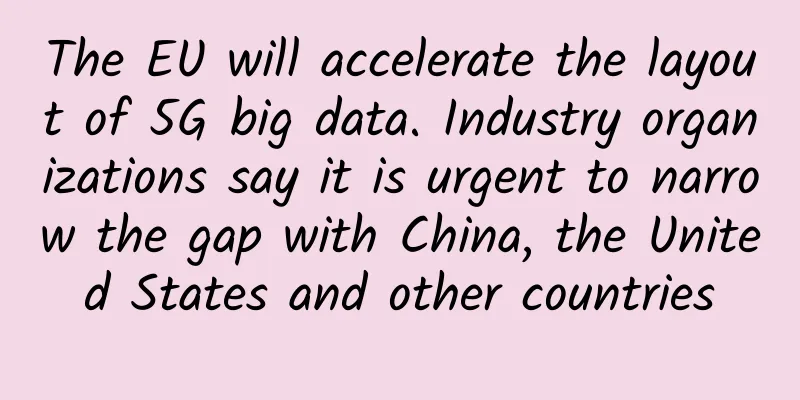The EU will accelerate the layout of 5G big data. Industry organizations say it is urgent to narrow the gap with China, the United States and other countries

|
The European Commission issued an initiative on September 18 local time, calling on EU countries to develop a "toolbox" of best practices by March 30, 2021. The recommendations should include measures to reduce costs, increase the speed of deployment, provide timely access to 5G radio spectrum, encourage operators to invest in expanding network infrastructure, and establish more cross-border coordination for radio spectrum allocations. European Competition and Digital Commissioner Margrethe Vestager said: "The current crisis has highlighted the importance of ultra-fast internet for businesses, public services and citizens, while also accelerating the move to 5G. We must therefore work together to enable rapid deployment of networks without any further delays." An industry report on the same day stated that Europe was slow in 5G deployment and lagged behind other parts of the world. A research report by the European Industry Roundtable (ERT), Europe's largest business lobbying organization, pointed out that more than half of the 27 EU member states have not yet launched 5G commercial services, while South Korea and the United States have already provided initial services last year. In addition, the EU currently has 10 5G base stations per million people, while South Korea has 1,500 per million people. "Although Europe has two of the world's leading telecommunications companies, there are growing concerns that Europe lags behind other regions in 5G deployment." ERT currently has 55 members including Nokia, Ericsson, Daimler, BMW, Shell, AstraZeneca, Volvo and others. ERT found that one of the factors hindering the launch of 5G is that many European countries have not yet allocated sufficient bandwidth or planning and construction permits for cellular towers. Although radio spectrum availability is not an issue, the delay in spectrum allocation has added uncertainty and planning difficulties to 5G deployment, and has also led to Europe's poor performance in spectrum availability. In addition, Europe's current 4G network penetration rate is lower than that of other countries, which further slows down Europe's 5G upgrade process. In 2019, about 70% of mobile phone users in Europe used 4G networks, while in the United States, South Korea and China, this proportion was about 90%. Martin Lundstedt, Chairman of the ERI Digital Transformation Committee and CEO of Volvo Group, said that 5G technology is crucial to Europe's digital transformation and industrial innovation, and is also an important part of achieving the green and environmental protection advocated by the EU Green Deal. Europe has strong industrial strength and we can do better in supporting 5G deployment. ERT also called for countries to take immediate action to narrow the gap with the United States, South Korea and China. They suggested that countries should optimize the spectrum allocation process and introduce more incentives to encourage private investment to support 5G development. Affected by the epidemic, the EU's 5G deployment has been delayed. Thierry Breton, the EU's internal market commissioner, said on September 18 that it now appears that the plan has been delayed by four months. According to the 5G Action Plan (5G for Europe: An Action Plan) announced by the European Commission in 2016, by 2020, member states should choose to provide 5G services in at least one city, but due to the impact of the epidemic, many countries, including Spain, Austria, Portugal, Poland and the Czech Republic, once postponed spectrum auctions in March. Thierry Breton said that it is now necessary to ensure that member states deploy 5G at a unified speed, and the EU level will also make feasible recommendations on how countries can encourage private investment. Industry organizations welcomed this. Laszlo Toth, head of European public policy at the Global System for Mobile Communications Association (GSMA), said that this is a move to get the EU 5G action plan back on track, and EU countries still need to explore a practical approach to spectrum auctions and site licensing. In addition, the EU also announced that it would allocate 8 billion euros from the 750 billion euro recovery fund to invest in the next generation of supercomputers to promote the development of the next generation of processors. Under the initiative, EU member states should identify best practices for the “toolbox” by December 20, 2020 and reach agreement on the list by March 30, 2021. |
<<: Europe lags behind in 5G rollout, study shows
>>: The number of domestic 4G users has reached 1.29 billion, with a penetration rate of 80.7%.
Recommend
Problems that edge computing needs to solve urgently
At present, edge computing has been widely recogn...
Virtualization Journey
So, how can enterprises fully realize the benefit...
NB-IoT standard is expected to be commercially available in 2017
June 16, 2016 was the most important day for the ...
To develop new infrastructure, major cities across the country have pressed the "start button"!
Suddenly, as if overnight, a spring breeze came, ...
Can SD-WAN trigger a comprehensive telecom NFV transformation?
The premise behind a software-centric, virtualize...
RAKsmart: US CN2 line VPS monthly payment starts from $0.99, Japan/Hong Kong VPS monthly payment starts from $2.99
The day before yesterday, we shared the news of R...
RAKsmart: Los Angeles/San Jose E3 servers at $30.62/month, Japan/Korea E5 servers starting at $59/month
This month, RAKsmart launched a flash sale for in...
2022 UBBF | Huawei iMaster NCE promotes FTTR intelligent monetization
[Bangkok, Thailand, October 28, 2022] Recently, t...
Telecommunications industry becomes the largest AI market and will reach an important turning point in 2021
Tractica/Ovum, a world-renowned market research c...
ThomasHost: US/France/UK/Canada KVM starting at $5/month, supports Windows
ThomasHost domain name was registered in 2012, an...
How 5G will change your LAN security
The Local Area Network (LAN) as we know it today ...
The first comprehensive definition, the "2022 Enterprise Application Operation and Maintenance Management Index System White Paper" was officially released
Recently, Borei Data and iResearch jointly releas...
Huawei's new ICT empowers enterprises to actively embrace digital transformation
[51CTO.com original article] Huawei's 16th Gl...
Exclusive for newcomers of Hengchuang Technology: Hong Kong cloud server is 28 yuan for the first month/220 yuan for the first year, and the monthly payment of Hong Kong server is 900 yuan
Domestic cloud service providers such as Alibaba ...







![[Black Friday] spinservers: 10Gbps San Jose/Dallas servers starting at $89/month, 50% off on all hybrid servers, $200 off on high-end servers](/upload/images/67cac216758fc.webp)
![[Black Friday] DediPath: 35% off VPS/Hybrid Servers starting at $1.2/month, 1Gbps unlimited traffic, multiple data centers in Los Angeles and other places](/upload/images/67cabff351bf1.webp)
